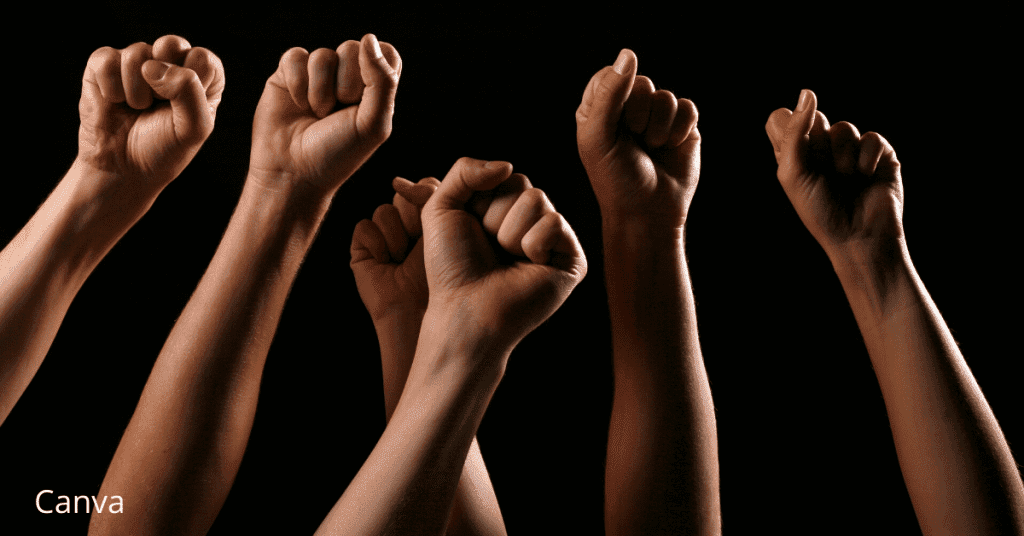
It is time for us to pause. To step away from all the rhetoric and listen. If I am only adding to the rhetoric, I am sorry. If I am providing some fresh insights that promote peace and reconciliation, then glory to God.
Less than a month ago I published a blog relating to the death of Ahmaud Arbery. I noted, “not long into my tenure there was the killing of an unarmed black man.” I mentioned, “let’s be honest: that sentence is probably true for every minister out there.”
Sadly, here we go again. This time, our country has responded riotously.
I am a follower of Jesus Christ, a pastor, and a New Testament (NT) biblical scholar. The more I study Jesus, the more I have become convinced of the disarming power of non-violent resistance.
I am not a pacifist in that I do believe in resistance. I just do not believe in violent resistance.
In his commentary on Micah, Old Testament scholar Daniel Smith-Christopher captures Jesus well when he says,
“When Peter foolishly presumes to take up arms against Rome, Jesus warns him with words that disarmed his followers forever: ‘Put your sword back into its place; for all who take the sword will perish by the sword’ (Matt 26:52). Although we are used to arguing that Jesus intends a moral argument against all violence, his life and teaching are more likely to be read, like Micah, to say, ‘This is not the kind of resistance I call you to.’”
Smith-Christopher continues,
“The common mistake in reading Jesus, as well as Micah, is to believe that opposition to violent resistance means opposition to all resistance. This is wooden thinking, morally irresponsible, and the typical self-serving argument of militarized minds (as well as the mistake of oppressors), which cannot imagine or understand the power of alternative forms of nonviolent resistance.”[1]
Do Riots Work?
While I do not believe in violence, there is some evidence that violent resistance has proven successful at various times in history.
What is interesting is that America has a long history of violent resistance. One may even say that America was founded on riots, beginning, of course, with the Boston Tea Party. Some riots have proven successful, depending, of course, from whose side of history you are looking at it.
After all, everything is a matter of perspective.
The recent riots in Hong Kong provide another paradox in the equation.
The peaceful protests in Hong Kong turned riotous, provided the justification needed for the mainland government in Beijing to impose a national security bill upon the citizens of Hong Kong. Many believe that this bill will undermine the judicial independence of the people of Hong Kong.
The response of the international community has overwhelmingly been quick to condemn the actions of Beijing. Most of the nations of the world, including the US, supported the rioters in Hong Kong and has strongly condemned the actions of Beijing.
Why, then, are so many condemning the riots in the US?
If the international community, including the US, has supported the riots in Hong Kong, why has the US government been so quick to condemn the riots in the states?
This raises the question: Is there a double standard? Are riots on foreign soil, against foreign governments okay, but riots on our own soil not acceptable?
This is equally puzzling when viewed against the backdrop of America’s own history of riots.
Of course, one will easily respond that the present riots are not the same as past riots. But that is too easily dismissive. After all, the past is never the same as the present.
(one must be careful here because it is too easy to view one instance through the lens of the extreme [looters destroying an Auto Zone or a Target] and another through the lens of an alternative extreme [say a caricature of the revolutionary war or the Boston tea party based on some elementary school experience. In our minds, we feel justified in comparing/contrasting the two accounts, but do we truly have a correct view of the two events? I doubt it.)
Non-Violent resistance
We tend to praise leaders like Jesus and Martin Luther King Jr. for their ability to resist violence. But we would also have to admit that few very of us have the courage to do what they did. How many of us would have the strength to stand up to their oppressors as they did by actually standing down?
Now, I believe that as Christians we are called to do just that. Though, I recognize that most Christians do not agree with me on this point.
It is here that I begin to chuckle. I am chuckling because even though Jesus commands us to take up our crosses and follow Him—that is, we are to stand down—very few Christians actually believe in non-violent resistance.
So, let me get this straight: we hail Jesus and MLK for their resisting violence. We affirm Jesus’ command to cross-bearing. And, we condemn the violent protestors over the last week throughout our country because they didn’t stand down.
But, then, on the other hand, you deny non-violent resistance. Wait a minute. If you do not believe in non-violent resistance, then how can you condemn the riots?
To this, you might respond by claiming that you are condemning the violent looting that is taking place throughout the country.
No problem. But this response is ignoring the larger problem. Allow me to explain.
Are we ignoring the larger problem?
For one, we tend to ignore the fact that almost every country was established on riots. As I already noted, America has a long history of riots. Some good and some not so good.
The very founding of this country was itself a “revolution” against the tyranny of British oppression.
Secondly, even most Christians do not believe in non-violent resistance. Yet, they claim that they cannot support the riots that are occurring throughout the US.
“Ah, but this is not the same,” you might contend! These rioters are clearly hooligans.
Well, that may be the case in some instances. But it certainly doesn’t account for all of it.
There will always be situations of unrest in which people will take advantage of the situation.
But, I am not sure that it is fair to judge the whole by those who are causing such destruction. We know that the media is going to give them the most attention. After all, sex sells. Hooligans make good stories.
What is the cause of these protests?
What is often missing from these discussions is the essential question: what is causing these protests? What is it that is behind all this?
Now, I am not in any way condoning the acts of violence—after all, I believe in non-violent resistance.
But we must ask: what is the reason why people are compelled to gather in cities around the world to protest the death of a man in Minnesota?
Though the answer to this question is quite complex, the answer, at least in part, is bound up in the conviction that minorities and people of color live in a society full of systemic injustice.
Much has been written on this, and this post is not the place to delve into the discussion. In fact, whether the readers of this post agree or disagree is beside the point. The fact is that people of color believe that they live in a culture that perpetuates systemic injustice.
We might applaud Jesus and MLK for standing down. I might even believe that all Christians should stand down. You might even believe that all persons should peaceably protest.
The problem for myself, and the reason why I am in no position to condemn those who are protesting, is that I cannot relate. Who am I to sit and judge the actions of those who endure a life of daily oppression and injustice?[2]
I am in no position to even begin to understand where they are at. Now, it is my belief that we should not respond to violence. And I would hope that I would adhere to those beliefs if/when that moment should arise.
But, I cannot condemn those who have lived in a state of systemic injustice for years and have said “enough.” I would hope that my reaction would be like Jesus and MLK. I would hope that I would live up to the ideals that I profess.
Summary/Conclusion
Summary/Conclusion
I find it somewhat ironic that the protestors in Hong Kong, after resorting to violence, have received the backing of the US and many other nations. Yet, the US government has threatened lethal force against its own citizens who are protesting. How can they support foreign protestors yet threaten domestic ones?
I personally believe in non-violent resistance. At the same time, I cannot relate to those who live in a system of perpetual injustice.
I think it is time for those of us who have not experienced a life of systemic injustice to stop, look, and listen to the plight of those who have. Don’t tune them out because their protests have turned violent.
We live in country that we founded by violent protests. Soldiers of the king died because our forefathers violently protested.
Instead, we need to ask: why are they protesting? We need to listen to them. Hear their stories?
I strongly encourage you to click on this link and read this simple story of a college professor. This story may begin to provide insight into what people of color experience as a regular part of their life.
Then you might check out the resources in footnote #2. After that, you might sit with people of color, with women, and other minorities, and hear their stories. Just listen.
It is important to realize that people are not drawn to protesting and rioting because one man was killed. That simply does not happen.
And please do not make this about those who are taking advantage of the situation and using this as an opportunity to loot. This is what the media does. Sex and violence sell.
This distracts us from the real issues.
Now in saying this, I would also say that as a Christian, a pastor, and a biblical scholar, the people of God must speak up for justice. We are to cry out for the oppressed.
That includes people of color who live each in fear. That also includes law enforcement officials, many of whom serve our cities faithfully, trying to protect our families. They are now also in harm’s way even more because of the acts of irresponsible people.
As I was preparing to finalize this post I received a note from some friends at the Jewish United Fund who are also asking that we come together for good. The Jewish community now all too well what it is like to be a persecuted minority.
[1] Smith-Christopher, Daniel L. Micah (The Old Testament Library) (Kindle Locations 3229-3236). Presbyterian Publishing Corporation. Kindle Edition.
[2] See Alexander, Michelle. The New Jim Crow: Mass Incarceration in the Age of Colorblindness. New York: The New Press, 2010. Cannon, Mae Elise. Beyond Hashtag Activism. InterVarsity Press. 2020. Stevenson, Bryan. Just Mercy: A Story of Justice and Redemption. New York: Random House, 2015.












